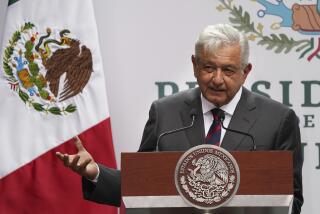Airline Allegedly Helped Fund Campaign : Mexico: Former Aeromexico chairman says company gave $8 million to President Ernesto Zedillo’s election effort.
- Share via
MEXICO CITY — A furor erupted here Tuesday over allegations that a financially troubled Mexican airline contributed $8 million to President Ernesto Zedillo’s campaign fund last year.
According to documents filed in a Texas lawsuit, fugitive former Aeromexico Chairman Gerardo de Prevoisin used his personal bank account to funnel corporate money to the campaign before he disappeared after being accused of defrauding shareholders of $72 million.
An Aeromexico lawyer denied that company directors had approved any political donations from corporate funds. Mexico City Mayor Oscar Espinoza, the finance director for Zedillo’s campaign, and ruling party officials did not return telephone calls Tuesday.
The allegations renew questions about the Mexican justice system and Latin American campaign finances, coming as they do after accusations that drug dealers in Colombia contributed to the campaign of that nation’s president, Ernesto Samper.
“Together with other officers and directors of the company, I did direct that Aeromexico issue a series of payments equaling $1 million each that went through my personal bank account at Citibank in New York,” De Prevoisin stated in documents filed in a federal court in Texas.
“Those payments, however, were made in Aeromexico’s behalf and, because of the government’s regular involvement in Aeromexico’s affairs, were required as a fact of business life in Mexico in a presidential election year.”
Aeromexico, previously owned by the Mexican government, is subject to government safety regulations and uses government-owned airports. The company agrees with De Prevoisin that eight such $1-million payments were transferred from Aeromexico to his personal account from January to August last year, coinciding with the Mexican presidential campaign.
But John H. Barr, an attorney for Aeromexico in the Texas case, said bank records he subpoenaed do not indicate that De Prevoisin gave that money to the campaign or the ruling Institutional Revolutionary Party, known as the PRI.
“The board of directors of Aeromexico did not know about Mr. De Prevoisin’s conduct, did not approve of it, does not sanction it and does not believe that any money went to the political party,” he said. “It is our belief that Mr. De Prevoisin is making these statements in an attempt to embarrass and confuse the issues.”
Texas courts are considering this case because Aeromexico is trying to recover a $1.2-million condominium that De Prevoisin bought from a Texas couple. The airline contends that he bought the property with embezzled money.
De Prevoisin’s statements revive issues about campaign financing that were raised two years ago. At that time, 30 Mexican millionaires whose businesses were subject to government regulation or recently had been purchased from the government were invited to a dinner and asked to contribute $1 million each to the PRI.
Although news of that fund-raiser caused a scandal, pressure on business people to financially support the ruling party has continued, said Luis Enrique Mercado, executive editor of El Economista, the economics daily that broke the story of the dinner.
“Major shareholders get together and make a contribution,” he said. “I know of at least four cases. The dinner did work.”
Such donations from shareholders, as opposed to money channeled from corporate funds, are legal, he said. Besides reviving the specter of ties between the ruling party and big business, the accusations also upset Mexicans because they were revealed in a U.S. court.
One radio announcer noted that, starting with the extradition hearing of former Deputy Atty. Gen. Mario Ruiz Massieu, revelations about the Mexican political system are increasingly coming out in U.S. court cases. The question, he said, is why such information is never revealed in Mexican courts.
More to Read
Sign up for Essential California
The most important California stories and recommendations in your inbox every morning.
You may occasionally receive promotional content from the Los Angeles Times.












